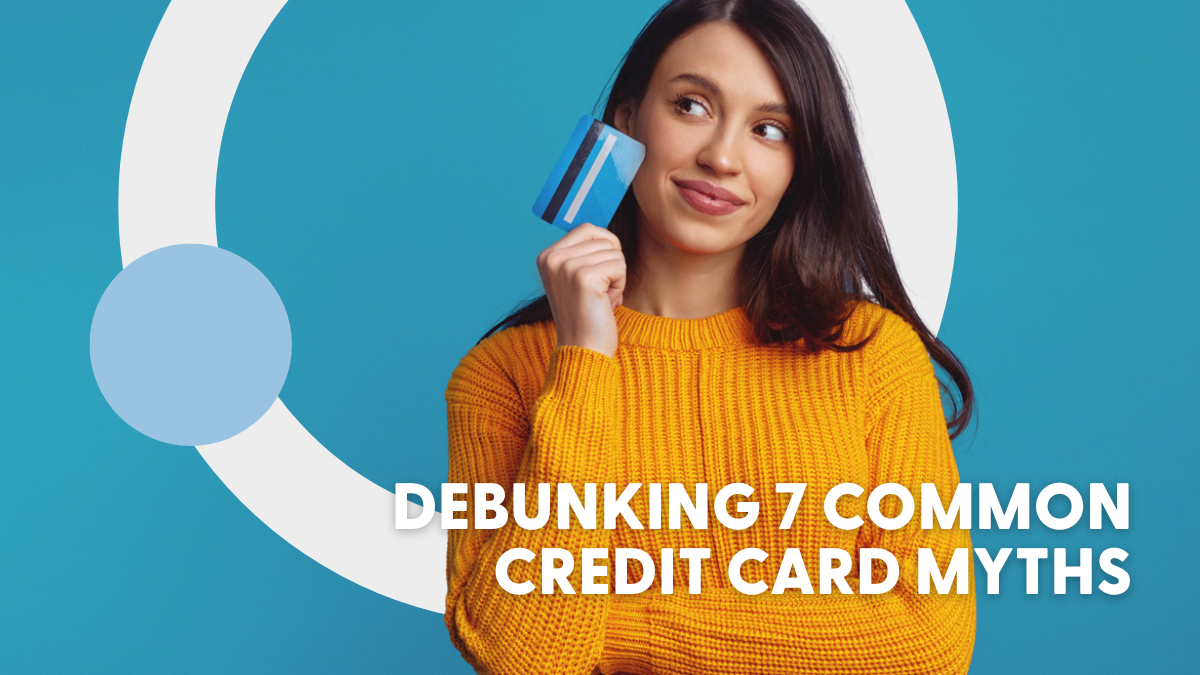May 1, 2025Debunking 7 Common Credit Card Myths
Credit cards are one of the most popular ways to pay for just about everything, thanks to their convenience and flexibility. But that convenience can come at a cost. Without a clear understanding of how credit cards work, it’s easy to fall into habits that lead to overspending, high-interest charges, and long-term debt.
The key to using credit cards responsibly – and making them work for you – is knowing the facts. Plenty of myths and misunderstandings exist about credit cards, how they affect your credit score, and what certain actions really mean for your finances. In this article, we’re setting the record straight by debunking common credit card myths so you can manage your credit more confidently and avoid mistakes that could hold you back.
Myth #1: Carrying a Balance Helps Your Credit Score.
Truth: While it is true that keeping your credit cards active can lead to a higher credit score, carrying a balance from month to month does not.
This misconception stems from the term “active.” To keep your credit card active, make a small monthly purchase and repay the full amount before the due date. Or, if you use your credit card regularly for purchases, aim to repay the entire balance at the end of the month.
You can build an excellent credit score without ever paying a single penny in credit card interest!
Myth #2: You Only Need to Make the Minimum Monthly Payment.
Truth: Making the minimum monthly payment on your credit card is enough to keep your account in “good standing,” but it’s not enough to make a dent in your outstanding balance.
The minimum monthly payment generally only covers accrued interest and fees charged – leaving your outstanding principal balance (the amount you owe) relatively untouched.
Always aim to repay as much as you can afford monthly. Consistently making only the minimum payments will lead to long-term debt and excessive interest charges.
Myth #3: Applying for a Credit Card Will Ruin Your Credit Score.
Truth: When you apply for a loan or credit card, the lender will pull your credit. This action can create a small ding on your credit score; however, the drop is usually temporary.
Credit problems usually result when you regularly apply for new credit cards or loans. Instead, only apply for loans when necessary and with purpose.
Example:
Imagine you apply for a new, lower-rate credit card. You plan to transfer your current high-interest balances to this new lower-rate card. Initially, you’ll see a ding on your credit report. However, using the lower-rate card reduces interest charges and helps you pay the balance off faster – ultimately leading to substantial savings and a significant boost to your score.
Myth #4: You Can’t Get a Credit Card If You Don’t Have Credit.
Truth: While it’s true that lenders look at your credit history, having little or no credit doesn’t automatically disqualify you. Many lenders offer options – like secured credit cards – specifically designed to help people begin building credit while keeping risk low for both sides.
Everyone must start somewhere, and there are tools to help you take that first step. For example, secured credit cards function like traditional cards; however, the balance is “secured” by funds in your savings account. Other lenders might start with a lower credit limit, such as $250, and watch how you manage the card for a few months. Then, if you’re handling the card responsibly, they can increase the limit.
Myth #5: High Credit Limits Damage Your Credit Score.
Truth: A higher credit limit can help improve your credit score. This myth stems from the fact that many people overspend on their credit cards if they have higher limits.
If you feel that a higher credit limit will tempt you to spend more, ask your lender to reduce the limit. Otherwise, set spending rules for yourself. For example, aim never to spend more than 30% of your card’s credit limit. If your credit limit is $10,000, strive never to have a balance over $3,000.
Maintaining a higher credit limit with a very low or $0 balance will help to boost your credit score.
Myth #6: An Authorized User’s Activity Won’t Affect Your Credit Score.
Truth: Any charge on your credit card will impact your credit score if you are the primary cardholder.
An authorized user is someone you permit to have a card associated with your credit account – allowing them to make purchases. For example, you might add your spouse as an authorized user or your older teenager as they learn to manage credit and for emergencies.
Any purchase an authorized user makes will increase your outstanding balance and affect your credit score. Always use caution when adding someone as an authorized user on your credit card.
Myth #7: Closing a Credit Card Will Improve Your Credit Score.
Truth: Many people close their credit cards immediately after paying off the balance. It’s a great feeling to eliminate a credit card balance you’ve been working to repay – but closing the card might be a mistake.
Your credit score is made up of several financial components – including the average age of your credit accounts and your utilization ratio. If you close a credit card, the average age of your accounts might decline – leading to a drop in your score. Likewise, your Credit Utilization Ratio (CUR) represents how much of your available credit you’re “utilizing” or spending. Closing a credit card can cause this figure to increase – negatively impacting your score.
Example:
Imagine you have two credit cards:
| Credit Card | Outstanding Balance | Credit Limit |
| Card A | $1,000 | $5,000 |
| Card B | $1,500 | $3,500 |
Your total Outstanding Balance is $2,500 with a $8,500 Credit Limit. Your Credit Utilization Ratio will be ($2,500 ÷ $8,500 x 100) = 29%. Assume you pay off Card A and close the account. Your balance is now $1,500 with a $3,500 limit, causing your CUR to jump to 43%.
You want to keep your CUR below 30%.
When you pay off a credit card balance, it’s typically beneficial to your credit score to keep the card active. However, if you feel tempted to spend on the card again, go ahead and close the account. While your score might take a minor ding, that’s better than the damage overspending can cause.
We’re Here to Help!
Credit cards can be powerful tools – if you understand how they work and avoid common myths. By knowing the facts, you can make wiser choices, manage your credit more effectively, and protect your credit score. Whether you’re building credit or paying down debt, a little knowledge goes a long way.
If you have questions about managing credit card debt or want to consolidate debt with a low-rate PEFCU Visa® credit card, we’re ready to help. Please visit PEFCU.com or call 800-226-6673 to speak with a Member Advocate today.
Each individual’s financial situation is unique and readers are encouraged to contact PEFCU when seeking financial advice on the products and services discussed. This article is for educational purposes only; the authors assume no legal responsibility for the completeness or accuracy of the contents.


